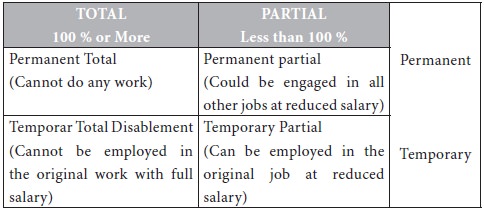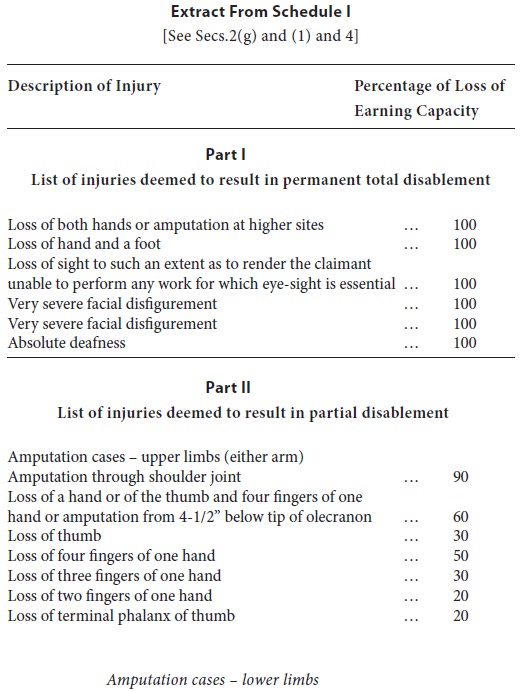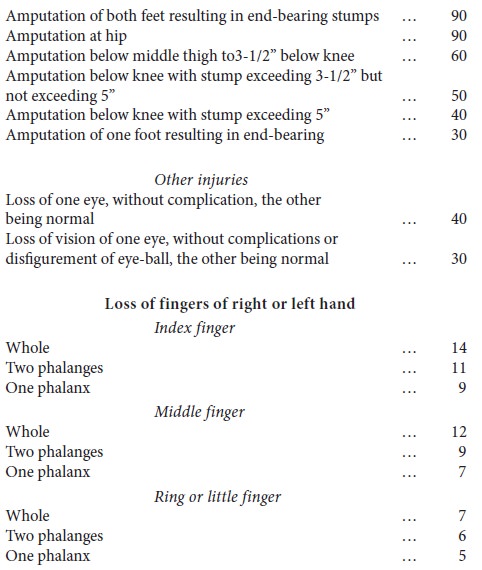Business Environment and Law-Workmen’s Compensation Act, 1923
Disablement - Workmen’s Compensation Act, 1923
Posted On :
The Act does not define the word “Disablement”. It only defines the “partial” and “total disablement”.
Disablement
The Act does not define the word “Disablement”. It only defines the “partial” and “total disablement”. Disablement means loss of capacity to work or to move. Disablement of a workman may result in loss or reduction of his earning capacity. In the latter case, he is not able to
earn as much as he used to earn before his disablement.
Disablement may be (i) partial, or (ii) total. Further it may be (i) permanent, or (ii) temporary.

A disablement may be partial or total. A partial disablement only reduces the earning capacity of a workman, while a total disablement incapacitates a workman, from all work, which he was capable of performing at the time of the accident. Partial disablement may be of temporary or permanent nature.

The distinction between these two types of disablement depends on the fact as to whether an injury results in reduction of earning capacity in all the employments which the workman was capable of doing or only in that particular employment in which workman was engaged at the time of accident.
The type of disablement suffered can be determined only from the facts of the case. But it is provided by the Act that injuries specified in Part II of Schedule I (given below) shall be deemed to result in permanent partial disablement. These injuries are known as ‘\\scheduled injuries’.


Total disablement means such disablement as incapacitates a workman for all work which he was capable of performing at the time of the accident resulting in such disablement. In order to constitute total disablement, disablement must be of such a character that the person concerned is unable to do any work and not merely the work, which he was performing at the time of the accident.
A total disablement may be temporary or permanent. A permanent total disablement shall be deemed to result from
1. The permanent total loss of the sight of both eyes; or
The Act does not define the word “Disablement”. It only defines the “partial” and “total disablement”. Disablement means loss of capacity to work or to move. Disablement of a workman may result in loss or
Disablement may be (i) partial, or (ii) total. Further it may be (i) permanent, or (ii) temporary.

Partial Disablement [Section 2(1)(G)]:
A disablement may be partial or total. A partial disablement only reduces the earning capacity of a workman, while a total disablement incapacitates a workman, from all work, which he was capable of performing at the time of the accident. Partial disablement may be of temporary or permanent nature.
(A) Temporary partial disablement means any
disablement, which temporarily
reduces the earning capacity of workman in any employment in which he was
engaged at the time of the accident which caused the disablement.
(B) Permanent partial disablement means such a disablement as permanently reduces the earning capacity of workman in every employment, which he was capable of undertaking at the time of the accident which caused the disablement. But, every injury specified in part of schedule I of this Act shall be deemed to result in permanent partial disablement.
(B) Permanent partial disablement means such a disablement as permanently reduces the earning capacity of workman in every employment, which he was capable of undertaking at the time of the accident which caused the disablement. But, every injury specified in part of schedule I of this Act shall be deemed to result in permanent partial disablement.

The distinction between these two types of disablement depends on the fact as to whether an injury results in reduction of earning capacity in all the employments which the workman was capable of doing or only in that particular employment in which workman was engaged at the time of accident.
The type of disablement suffered can be determined only from the facts of the case. But it is provided by the Act that injuries specified in Part II of Schedule I (given below) shall be deemed to result in permanent partial disablement. These injuries are known as ‘\\scheduled injuries’.


Total Disablement [Section 2 (1)(L)]
Total disablement means such disablement as incapacitates a workman for all work which he was capable of performing at the time of the accident resulting in such disablement. In order to constitute total disablement, disablement must be of such a character that the person concerned is unable to do any work and not merely the work, which he was performing at the time of the accident.
A total disablement may be temporary or permanent. A permanent total disablement shall be deemed to result from
1. The permanent total loss of the sight of both eyes; or
2. From an injury specified in Part
I of Schedule I or from any combination of injuries specified in Part II
thereof where the
aggregate percentage of the loss of earning capacity as specified in the said Part II against those injuries, amounts to one hundred per cent or more.
A carpenter suffered injury in the course of his employment, which resulted in amputation of left hand above elbow.
Since a carpenter cannot work with one hand, disablement was held to be total
and not partial [Pratap Narain Singh Deo Vs Srinivas Sabata and
another [AIR (1976) SC 222].
aggregate percentage of the loss of earning capacity as specified in the said Part II against those injuries, amounts to one hundred per cent or more.
A carpenter suffered injury in the course of his employment, which
Tags : Business Environment and Law-Workmen’s Compensation Act, 1923
Last 30 days 1768 views












